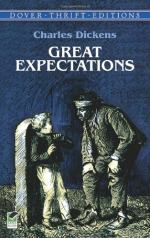As it seldom happened that I came in at that Whitefriars gate after the Temple was closed, and as I was very muddy and weary, I did not take it ill that the night-porter examined me with much attention as he held the gate a little way open for me to pass in. To help his memory I mentioned my name.
“I was not quite sure, sir, but I thought so. Here’s a note, sir. The messenger that brought it, said would you be so good as read it by my lantern?”
Much surprised by the request, I took the note. It was directed to Philip Pip, Esquire, and on the top of the superscription were the words, “Please read this, here.” I opened it, the watchman holding up his light, and read inside, in Wemmick’s writing:
“Don’t go home.”
Chapter 45
Turning from the Temple gate as soon as I had read the warning, I made the best of my way to Fleet-street, and there got a late hackney chariot and drove to the Hummums in Covent Garden. In those times a bed was always to be got there at any hour of the night, and the chamberlain, letting me in at his ready wicket, lighted the candle next in order on his shelf, and showed me straight into the bedroom next in order on his list. It was a sort of vault on the ground floor at the back, with a despotic monster of a four-post bedstead in it, straddling over the whole place, putting one of his arbitrary legs into the fire-place and another into the doorway, and squeezing the wretched little washing-stand in quite a Divinely Righteous manner.
As I had asked for a night-light, the chamberlain had brought me in, before he left me, the good old constitutional rush-light of those virtuous days — an object like the ghost of a walking-cane, which instantly broke its back if it were touched, which nothing could ever be lighted at, and which was placed in solitary confinement at the bottom of a high tin tower, perforated with round holes that made a staringly wide-awake pattern on the walls. When I had got into bed, and lay there footsore, weary, and wretched, I found that I could no more close my own eyes than I could close the eyes of this foolish Argus. And thus, in the gloom and death of the night, we stared at one another.
What a doleful night! How anxious, how dismal, how long! There was an inhospitable smell in the room, of cold soot and hot dust; and, as I looked up into the corners of the tester over my head, I thought what a number of blue-bottle flies from the butchers’, and earwigs from the market, and grubs from the country, must be holding on up there, lying by for next summer. This led me to speculate whether any of them ever tumbled down, and then I fancied that I felt light falls on my face — a disagreeable turn of thought, suggesting other and more objectionable approaches up my back. When I had lain awake a little while, those extraordinary voices with which silence teems, began to make themselves audible. The closet whispered, the fireplace sighed, the little washing-stand ticked, and one guitar-string played occasionally in the chest of drawers. At about the same time, the eyes on the wall acquired a new expression, and in every one of those staring rounds I saw written, don’t go home.




